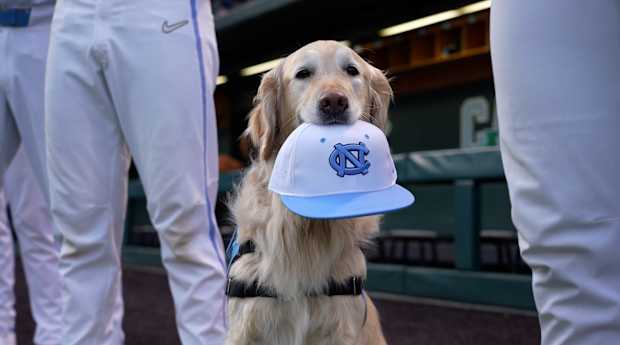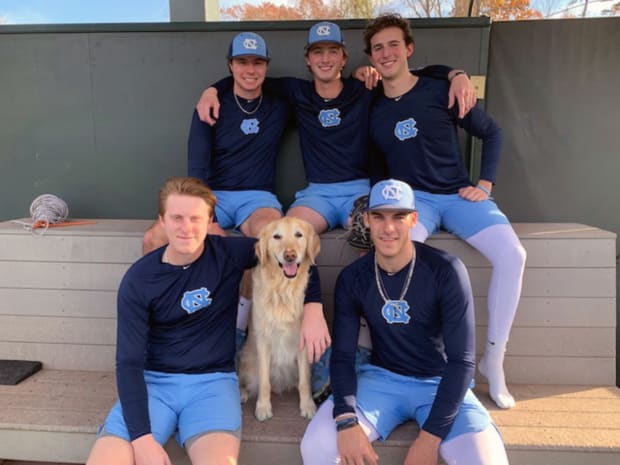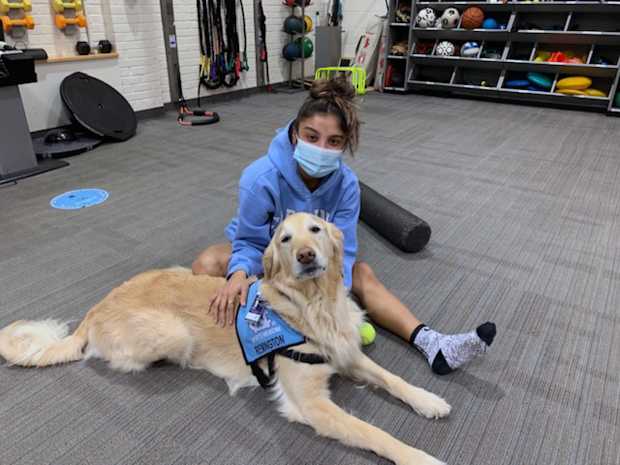CHAPEL HILL, N.C. — The sun beats down on Boshamer Stadium, not a cloud in sight in the Carolina blue sky. Music echoes throughout the concourse as the team lines up outside of the dugout. From afar, it looks like a normal spring day of University of North Carolina baseball—save for the golden tail peeking out of the Tar Heels’ lineup.
Meet Remington, the first athletic training room assistance dog for not just UNC but also the Atlantic Coast Conference. The golden retriever’s official position is as a psychiatric medical alert facility rehabilitation service dog, working alongside the baseball team’s head athletic trainer, Terri Jo Rucinski.
Remington was part of a litter at paws4people, Inc., a Wilmington, N.C., nonprofit that raises, trains and places assistance dogs with clients. According to the foundation, these dogs typically have one or more certificates to offer support in areas such as mobility, psychiatric service, rehabilitative assistance and therapeutic visitation.
“Remington’s role is to be someone that calms people, makes them laugh, makes rehab fun,” Rucinski says. “He helps destress people. I think that's his biggest role. And just to make people laugh and smile when they're having a bad day.”

Sports Illustrated Video
The duo’s day starts at 7:45 a.m. in the physical therapy clinic. When the afternoon rolls around, Remi heads to the athletic training room at Boshamer Stadium, spending time with the athletes during their treatments. He’s not limited to just baseball; Remi also helps with many other sports teams, including lacrosse, soccer and gymnastics.
Rucinski says his assistance varies in the training room, ranging from opening and closing the refrigerator to get a drink for the athlete to bringing the ball back to them as they do throwing exercises. But sometimes, he’ll be just a dog, climbing onto the beds with the players as they receive treatments, sensing when they need him.
During his senior season of high school, UNC pitcher Dalton Pence blew out his elbow and required Tommy John surgery. Remington was there when Pence received the news that the start of his collegiate career would be delayed.
“He was right there by my side, so just knowing that kind of settled the anxiety and stress a little bit. [It] comforted me,” Pence says. “There’s a lot of mental blocks that an athlete has coming back from a major injury, and he helped me get through some of that. I just kind of gained [back] confidence through Remington.”

Courtesy of UNC Athletics
He’s certainly more than just the baseball dog. In fact, since arriving at UNC during the 2017 season, Remington’s role has unofficially expanded, particularly in the wake of the COVID-19 pandemic and the mental health crisis plaguing college campuses.
According to data from the Centers for Disease Control and Prevention, suicides and suicide attempts have spiked during the pandemic, particularly when lockdowns were enforced, among ages 12 to 25. And per the National Institute of Mental Health, suicide ranks as the second leading cause of death for ages 15 to 34.
Today, a dark cloud rests over the Chapel Hill community as it mourns the lives lost last fall. Three UNC students died by suicide on campus, two within a 48-hour period one October weekend, prompting the university to cancel classes during midterms to give students a “wellness day.”
In wake of Naomi Osaka and Simone Biles stepping away from their respective sports for mental health reasons in spring and summer 2021, Dr. Jeni Shannon, the director of mental health and performance psychology at UNC, has seen the dialogue around mental health and athletics change.
“It's opened the doors for a lot more real and honest conversations,” she says. “It's been incredibly empowering. We've had increasingly high numbers of athletes say, ‘I need help with this,’ just like they used to for a physical injury.”
The North Carolina athletics community put mental health awareness at the forefront following the suicides in the fall.
“We really deepened the type of conversations we have about what everyone is going through, and found a lot of opportunities to emphasize how much more important your life is than your grades, your performance—than anything else,” Shannon says.
Fast forward seven months, another wave of suicides hit the college world, this time within the athletics community. Stanford soccer captain Katie Meyer, Wisconsin-Madison cross-country runner Sarah Shulze and James Madison softball star Lauren Bernett have died by suicide over the last several months.
“I think that made everyone pause, and it’s still very heartbreaking that it takes something like that to make people pause to have that conversation,” says UNC women’s soccer player Madi Pry. “But what I’ve seen change in our team is we’re taking pauses or we’re having meetings. They’re uncomfortable meetings, because nobody wants to be vulnerable enough to say when they are struggling. Our team has just done a good job of changing the way that we're looking at everything.”

Courtesy of UNC Athletics
Pry says Remington has provided comfort for the athletes during the difficult conversations since Meyer’s death.
“For one, just to have something that’s comfortable when you’re having a hard conversation makes it easier to open up about stuff like that. If you feel like you’re in a safe spot, then it’s easier to have those conversations,” she says. “For me, Remington has become a shoulder to lean on if I’m anxious or nervous or just not having a good day. He makes me feel O.K. being vulnerable with the people that are around me.”
Pitcher Nick Argento echoed Pry’s sentiments about Remington. “We all go through struggles. Baseball is a game of failure,” he says. “And so when you fail, just to go back and you can even just go look at Remi. He gives you that positive attitude. I truly feel like Remi has superpowers.”
Shannon says the golden retriever provides an avenue for “people to have increased awareness of their own mental health and access to the idea that they might need some additional support.” She added that he will “anchor on people,” signaling for them to check in with themselves to see how they are feeling. He can sense when someone is struggling, whether that be because of an injury or a terrible day. He provides comfort to people, opening the door for Rucinski to check in with the athlete.

Courtesy of UNC Athletics
“The most important thing is finding the ways that we can open the doors for conversation and access to mental health support,” Shannon says. “Any avenue that gets us closer to people getting the type of support they need, any avenue that gets us closer to real, open, vulnerable conversations, that’s the most important thing. That’s the best thing we can do.
“And I think Remi has been such a creative and unique avenue that I don’t know that any of us ever expected to work out exactly the way it did.”
Editor’s note: If you or someone you know is having thoughts of suicide or is in emotional distress, contact the National Suicide Prevention Lifeline at 1-800-273-TALK(8255) or at suicidepreventionlifeline.org.







